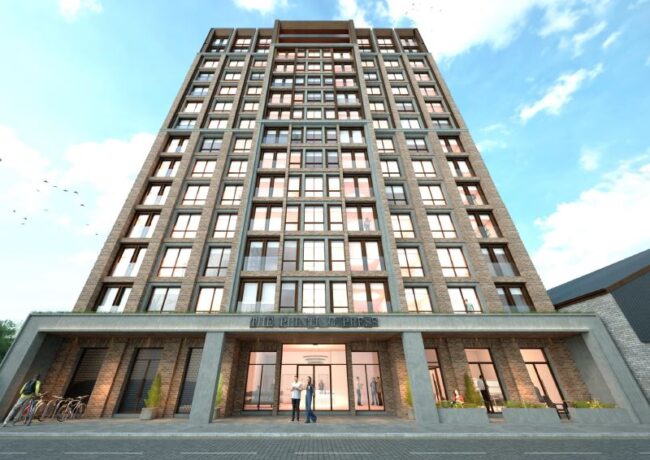‘Mono-social city living’ faces growing pains
Licensing and planning conditions need to be tightened in Liverpool city centre to prevent its decline into an 'inhumane and unhealthy' place to live, according to a new collective of residents associations.
Engage Liverpool used an event last night to call on the council to limit drinking time around Concert Square and Ropewalks, align licensing and planning decisions more closely, enforce planning conditions properly, consider accrediting managing agents, set quotas for owner-occupiers and promote the quality of schools in the city centre.
Read Engage Liverpool chairman Gerry Proctor's speech in full below
Nearly 100 guests attended the event hosted by Engage Liverpool, sponsored by Plus Dane Group and held at Hill Dickinson's offices.
Guests included Louise Ellman MP, Cllr Steve Munby, cabinet member for neighbourhoods, Chris Bliss, estates director of Liverpool One, along with other developers, housing association executives, public sector regeneration bosses and residents.
Nigel Lee, head of planning at the city council, Max Steinberg, chief executive of Liverpool Vision, Prof Dave Shaw of Liverpool University and Bill Maynard, retired MD of Urban Splash in Liverpool.
The council and agencies welcomed the debate and agreed to meet with Engage, which aims to help establish residents associations in every block in the city, again to help improve the living standards in the city centre and waterfront.
Our city, our place? A resident's perspective
By Gerry Proctor, City Quay resident and chairman of Engage Liverpool
Aristotle is quoted in Richard Sennett's 1994 book Flesh and Stone – the Body and the City in Western Civilisation as saying: "A city is composed of different kinds of men; similar people cannot bring a city into existence" and Lewis Mumford in his seminal work in 1961 'The City in History' developed his idea further, defining the city as "a place of conversation" – where difference inspires the challenge towards dialogue. We are creating city tonight; we are facilitating the dialogue which is essential for urban progress.
The market-driven, headlong rush into building apartment blocks and conversions of long-vacated commercial property over the past two decades has in fact constructed a city that is predominantly mono-social, with young professionals and students dominating the population surveys. And yet hidden in the statistics are a growing number of older retired and semi-retired empty-nesters as well as a younger group unable to sell their apartments and now having children in buildings never designed for that purpose.
I speak today for the 23,000 estimated residents of the City and Waterfront who live in 13,358 apartments spread across 180 blocks representing over £2bn of investment in this city and delivering an annual Council Tax of £15m and spending approximately £6m in service charges, potentially in the local economy.
We expect planners, developers and architects, as well as residents, to assist the process of creating a city where all kinds of people live together; generational alongside racial as well as the gender-defined alongside a diverse social mix. Our difference is our strength and is to be celebrated and encouraged. The provision of small one- and two-bedroom apartments predominantly for the buy-to-let property boom has not facilitated a sufficient variety of residential property types attractive to older people, families and different social groupings.
Neither has the complete mixing of the night-time economy with the residential sector led to the creation of the conditions necessary for the health, well-being and happiness of many in the city centre. Lessons need learning and changes need to be made to licensing regulations and planning policy putting at the forefront of decision-making not the profit motive only but the human person and our basic need to live in and create sustainable communities. Many of the buy-to-let absentee landlords are just as much a nightmare for apartment dwellers as the party-loving young professionals. Why have developers and planners not imposed appropriate ratios of owner-occupiers to tenants in new developments?
To be successful a city needs to have a vibrant residential sector right alongside a vibrant business and commercial sector. We want to work in partnership with those charged with delivering a dynamic economy for the city. Many residents from Wapping Quays, The Colonnades, and Waterloo Warehouse have lived here for almost 20 years and have much experience and insight to offer. Other newer arrivals in the city centre have made a life-style choice to make this place their permanent home and they too have stories worth telling.
The demographic is likely to change rapidly over the next decades as the generation that misspent their youth in the Cavern Club in the '60s and at Eric's Club in the '70s come back to town to misspend their children's inheritance in their remaining active decades of life. Are we building properties with them in mind? Is the city sufficiently adapted for the generational needs of these citizens?
Could I suggest we consider establishing ad-hoc forums for city-dwellers to assist those who run the city in making our communal spaces better for everyone? Might we reflect on the possibility of denominating neighbourhoods within the Centre and Waterfront to enable a greater sense of identity and belonging and creating a sense of place? How about setting standards for the proper management of apartment blocks by developers? We have so much to say and share.
Liverpool has a great story to tell and thanks to Engage we are ahead of the game compared with other cities in the UK. I want to propose tonight that this should just be the start of a conversation not the last word. Residents have initiated this gathering now let's see some of the others taking it forward and continuing the discussion. We more than anyone else have much to gain if this dialogue goes ahead and a lot to lose if it doesn't.
- Visit the Engage Liverpool website here



